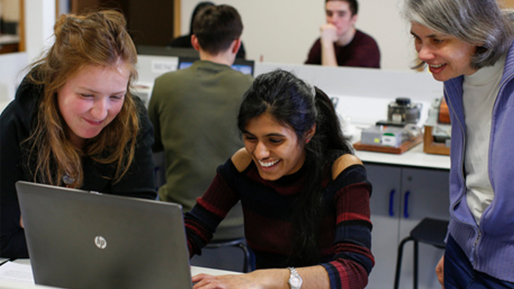
Law with Foundation Year (West Herts College)
Discover the fundamentals of law and develop critical legal thinking. This law with foundation year course introduces you to a variety of professional skills preparing you for further legal studies.
-
Typical offer: 48
Entry requirements -
Fees: £5,760 per year (UK)
Full details -
UCAS code: M102
-
Course length: Full time: 5 years
Find out more -
Location:
- West Herts College
-
Institute code: H36
-
Work placement option
Find out more -
Study abroad option
Find out more
Course overview
Law with foundation year is designed as a preparatory year to enable you to acquire the necessary knowledge and skills you need to progress to the first year of Bachelor of Laws (LLB) course. The foundation year will prepare you for the demands of Level 4 study by introducing them to a number of core legal subjects.
The unique feature of this course is that not only will you learn about the theory of subjects, but you'll also have the opportunity to apply this knowledge in the Legal Drafting and Advocacy modules. You will prepare court documents such as skeleton arguments setting out your case and then practise these skills during mock hearings and advocate your case.
Why choose this course?
Pathway to Bachelor of Laws (LLB): Allowing you to become qualified within 5 years. In order to progress to llb, you will need to pass all modules (120 credits) with an overall average of 50%.
Expert tutorial support and practical knowledge: Gain in-depth expertise in areas such as constitutional law and legal drafting, while preparing for careers in public services, local government, and the civil service.
Career-enhancing skills: Build confidence and strengthen your practical, study, and theoretical abilities to stand out to future employers.
Your future career
On completing your Law with Foundation Year and completing the Bachelor of Laws LLB (Hons) you will have the opportunity to kickstart your career in many sectors.
Roles in which you could undertake after completing the full 5 year degree includes:
- Paralegals
- Compliance
- Officers
- Solicitors
- Barrister
You'll have the option to move into a career in law or into a whole array of related fields such as the civil service, local government, research, teaching, politics and public services. A reputable degree will also open many other doors into graduate employment in other fields.
What you'll study
The Law with Foundation Year will introduce you to a variety of legal skills such as interviewing and advising, advocacy, legal research and writing. You will also be introduced to more traditional core modules such as contact law and criminal law. Combined, these skills will prepare you for further legal studies.
You will be taught and assessed through a combination of lectures, small group tutorials, practicals and course work. Throughout, you will undertake directed and self-guided independent study to consolidate your learning and to broaden your knowledge and understanding of the subject. You will have the opportunity to enhance your transferable skills by engaging with Hertfordshire Law School’s co-curricular activities and Hertfordshire Law Clinic.
What if I need support?
We’re here for you. Our school is a warm, welcoming community where you’ll find plenty of people to encourage you through your studies. You’ll have your own Academic Support Tutor for the whole time you’re here, and our friendly course and cohort leaders are always happy to talk things through. If you need some personal support, we’ve also got our own wellbeing leader, and the majority of our academics are trained and accredited in mental health first aid.
For additional help with study skills, including referencing, essay writing and presentations, you’ll have access to our academic support services. You can attend workshops, 1-to-1 sessions and online tutorials.
Optional sandwich year
Graduate with invaluable work experience alongside your degree and stand out from the crowd. This course offers you the opportunity to enhance your study and CV with a year in industry, typically between your second and third years of study. It’s a chance to explore career possibilities, make valuable contacts and gain sought after professional skills.
Research shows that over 70% of employers prefer students with work experience, which is why we believe work placements are career gold. Our Careers and Employment service are here to support you explore your options and make valuable contacts for your future career.
You’ll pay no tuition fee for this year and won’t need to worry about the details of your placement until your second year of study.
Study Abroad offers the opportunity for an amazing experience, which will help make you stand out from the crowd. With more and more companies working internationally, experience of living in another country can make a great impression on future employers.
This course offers you the opportunity to enhance your study and CV with a sandwich year abroad. The University has partnerships with over 150 universities around the world, including the USA, Canada, Asia, Africa, Australia, South America and closer to home in Europe.
If you study abroad between your second and third year of study, you’ll pay no tuition fee to the partner university and no tuition fee to us either. We’ll ask you to make your decision in your second year, so there is plenty of time to think about it.
Graduate with invaluable work experience alongside your degree and stand out from the crowd. This course offers you the opportunity to enhance your study and CV with a year in industry, typically between your second and third years of study. It’s a chance to explore career possibilities, make valuable contacts and gain sought after professional skills.
Research shows that over 70% of employers prefer students with work experience, which is why we believe work placements are career gold. Our Careers and Employment service are here to support you explore your options and make valuable contacts for your future career.
You’ll pay no tuition fee for this year and won’t need to worry about the details of your placement until your second year of study.
Find out more about work placementsStudy Abroad offers the opportunity for an amazing experience, which will help make you stand out from the crowd. With more and more companies working internationally, experience of living in another country can make a great impression on future employers.
This course offers you the opportunity to enhance your study and CV with a sandwich year abroad. The University has partnerships with over 150 universities around the world, including the USA, Canada, Asia, Africa, Australia, South America and closer to home in Europe.
If you study abroad between your second and third year of study, you’ll pay no tuition fee to the partner university and no tuition fee to us either. We’ll ask you to make your decision in your second year, so there is plenty of time to think about it.
Find out more about study abroad optionsWhere you'll study
You will carry out your studies at West Herts College based in Watford. Our campus is packed with modern facilities to improve your learning experience. When you are not studying, take advantage of the onsite gym and fitness studio or catch up with friends in the restaurant or canteen.
Check out our student blogs
How we support our students
At the University of Hertfordshire, we want to make sure your time studying with us is as stress-free and rewarding as possible.
We offer a range of support services, from childcare to counselling, ensuring that you make the most of your time at Herts and can focus on studying, having fun, and have the support you need.

Student Blogs
Neofytos - My week at a glance
My week at a glance.
My week starts by attending to my studio space, which it is a corner made up of three big whiteboards, a locker to secure my belongings and a table to work on. I personally love that space! It always makes me feel good! Having this area to work and do research for projects that I have been given, make me feel focused and productive.
On Tuesdays I have a lecture which is about two or two and a half hours, depending on how much we need to cover. In our lecture, we talk about theories that could be beneficial to our artistic perspective, but we also use this time to talk about anything that involves group assignments and projects.
Wednesdays for me only consist of an hour of optional art talks. During these talks, we have the chance to attend a seminar where artists are presenting their work to us! That's an amazing way to be provided with an insight into how the industry works and be prepared for our working lives after graduation.
Lastly, we have our optional life drawing sessions which run every Thursday's afternoon is a great chance to have a little break from spending most of your time in your studio space working on your projects. Going to the life drawing session I have the great chance to see the human figure, as well as being given the fantastic opportunity to draw models.
As for Friday, I have nothing booked on, so I can spend most of my time in my studio space working on my projects without getting distracted!
I love my routine at university, it gives me both the time to work on my projects thus attend and organise sessions and group works.

Student Blogs
Nicole-Therese - Things you should know
Things you need to know before studying Law at university
The first thing that you need to know before you attempt to study Law at university is that there needs to be a lot of hard work and commitment on your part.
Studying Law is not an easy task so you need to make sure you set your priorities straight. You cannot afford to lose focus so make sure you put in a lot of work and you will always be successful.
Ask questions/ Be willing to seek advice or help
If there is anything that you do not understand or you need clarification on, make sure that you make this known to your lecturers or tutors. Don’t be afraid or embarrassed to seek help. There is a lot of support available to Law students so make sure that you utilise this. Make sure to use all resources available to you, for example, drop-in sessions which take place during the week.
Get involved / participate in extra-curricular activities
As a law student, it is imperative for you to participate in co-curricular activities. Not only are these activities super fun and enlightening they boost your cv and make you stand out to a future employer. In my opinion, they also give you a sense of reality; a glimpse of what it may be like when you’re out in the real world actually practising Law.
Do a significant amount of research on the modules you may decide to choose in your second and third year of University.
In our second and third year, we have the option to choose certain modules we would prefer to study. Make sure that you know what those modules would entail and you are sure that it is something that you are interested in.
Managing your time well
It is so important to be proficient at time management while at university. There is a lot of content to learn every week and most of the course consists of independent study. I understand that many people engage in part-time work while at university so it’s important that you have a daily planner or some system that is organised to make sure you don’t fall behind on your academic work.
Attend as many seminars/ Workshops as you can
There are often very informative workshop sessions on various topics and issues for example “how to find work opportunities” or “UK immigration & post-study work: what are your rights?” – this one was really helpful to me as I’m an international student. There are also loads of networking events where you could meet potential employers and mingle with people who could give you an insight of what life after university could be like.

Student Blogs
Leah - Things you should know
Things to know before coming to Herts
I cannot speak on behalf of other courses but when it came to criminology and criminal justice, I had what felt like a lot of free time. Having said that, I would heavily recommend timetabling your week. At first, I felt a little overwhelmed with the jump from A-levels and the new feeling of fending for myself completely. It was hard to handle it all but once I started to plan out my week it helped so much, and I had such an enjoyable time at university. This obviously does not mean you should plan your week or month to a tee, but it was so helpful to have an idea of what I should be doing. Of course, things come up especially when it comes to the events that are held all the time, but it helped immensely.
Entry requirements
The University of Hertfordshire is committed to welcoming students with a wide range of qualifications and levels of experience. The entry requirements listed on the course pages provide a guide to the minimum level of qualifications needed to study each course. However, we have a flexible approach to admissions and each application will be considered on an individual basis.
| Typical offer (UCAS points) | (enter tariff range) |
|---|---|
| Typical A Level offer | (enter range) |
| Typical IB offer | (enter range) |
| Typical BTEC offer | (enter range) |
| Typical T Level offer | (enter range) |
| GCSE | EG: Grade 4/C in English Language and 4/D Mathematics |
| Access courses | EG: An overall merit profile in 45 credits at Level 3. |
| Additional information | Find out more about our standard and contextual Undergraduate Entry Requirements. |
| Typical offer (UCAS points) | 48 |
|---|---|
| Typical A Level offer | DD |
| Typical IB offer | 48 |
| Typical BTEC offer | PPP |
| Accepted T Levels | Design Survey and Planning for Construction; Design Production, Design and Development; Education and Childcare; Healthcare Science; Health; Science; Digital Support Services; Digital Business Services; Onsite Construction; Building Services Engineering for Construction; Accounting; Design and Development for Engineering and Manufacturing; Engineering, Manufacturing, Processing and Control; Finance; Maintenance, Installation and Repair for Engineering and Manufacturing; Management and Administration; Agriculture, Land Management and Production; Legal Services |
| GCSE | Grade 4/C in English Language and 3/D Mathematics |
| Access courses | An overall pass required |
| Additional information | Find out more about our standard and contextual Undergraduate Entry Requirements |
Ready to apply?
UK and EU applicants with pre-settled/settled status in the UK
| Start date | Study type | Apply |
|---|---|---|
| September 2025 | Full time | Apply via UCAS |
| Full time with placement year | Apply via UCAS | |
| Full time with study abroad | Apply via UCAS |
Fees and funding
At Herts, we’re dedicated to providing world-class teaching supported by industry-level facilities and incredible social spaces. We believe cost shouldn’t be a barrier to higher education, and we strive to keep both our standard and additional costs as low as possible.
| Study type | Fees | |
|---|---|---|
| UK students | Full time | £5,760 for the 2025/2026 academic year |
Tuition fees are charged annually. The fees quoted above are for the specified year(s) only. Fees may be higher in future years, for both new and continuing students. Please see the University’s Fees and Finance Policy (and in particular the section headed “When tuition fees change”), for further information about when and by how much the University may increase its fees for future years.
| Scholarships, grants and bursaries | Depending on your circumstances, you may be eligible for a non-repayable scholarship, grant or bursary to support your studies. |
|---|---|
| Disabled Students' Allowance | The Disabled Students’ Allowance can cover any study-related costs you have because of a mental health problem, long term illness or any other disability. |
| Student loans | Find out about securing a student loan, from how much you could be eligible for to when you need to start making repayments. |
| Accommodation costs | We offer a great choice of student accommodation, on campus or nearby in the local area, to suit every student budget. |
| Additional course fees | Read more about additional fees in the course fact sheet. |
More about the course
| Course fact sheets | |
|---|---|
| Law with Foundation Year | Download PDF |
| Programme specifications | |
|---|---|
| Law with Foundation Year | Download PDF |
| Additional information | |
|---|---|
|
Applications open to international and EU students |
No |
Course length |
Full Time, 5 Years |



